
Enable Instagram shopping for your brand’s #hashtag or @mention used by influencers
Here’s a quick walkthrough of how you could be leveraging influencer marketing on Instagram and letting customers shop for products seen in influencer posts marked with your brand’s #hashtag or @mention. We’re successfully doing it for our demo apparel brand Fearnot utilizing the latest dev capabilities enabled by Facebook and Instagram. These capabilities are continuously evolving so stay tuned for more updates.
How is Fearnot leveraging Instagram shopping?
Fearnot is an apparel brand for sports and outdoor adventurers. They travel the planet searching for the best waves, wind, or just beautiful places to enjoy. They post a lot of amazing photos on Instagram. We’ve handed them a lot of free Fearnot gear and asked to post in their Instagram feeds using a #dofearnot hashtag or @dofearnot mention. In these posts, they also share their personal influencer promo code which gives their followers a discount while they get a revenue share from all the items sold to their fan base. Instagram shopping enabled!
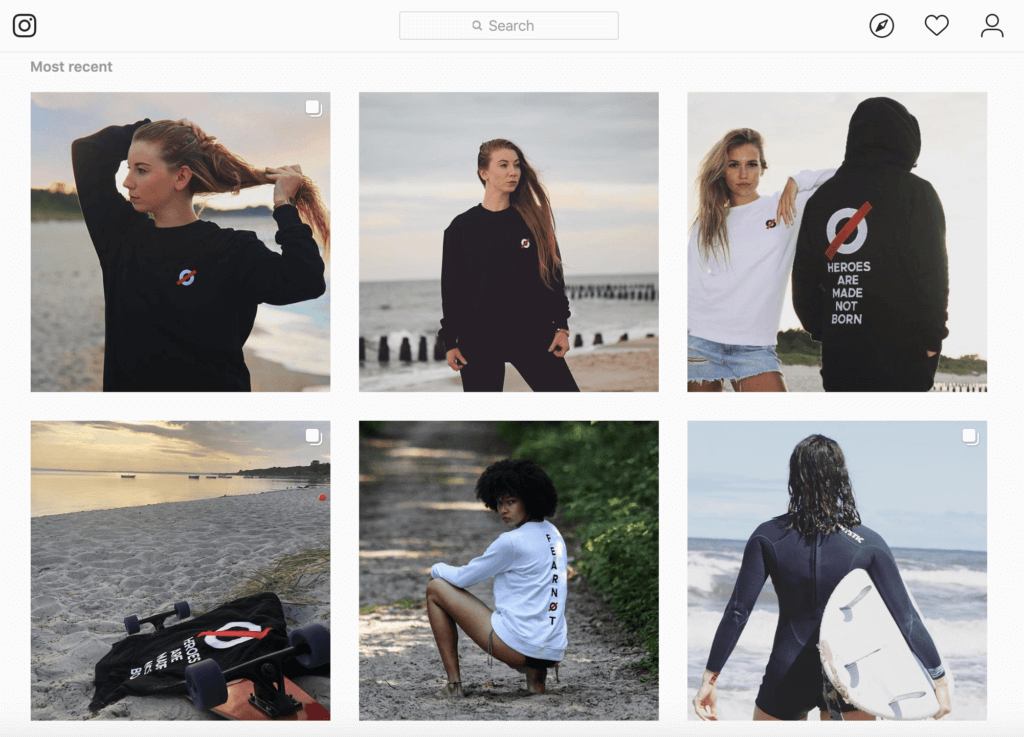
When our influencer’s followers see the post showcasing our gear they hit the Fearnot Instagram account (@dofearnot) and click on the store link in the bio.
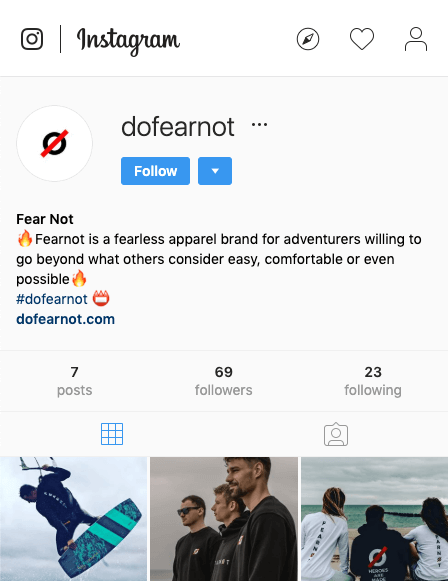
Or they just google “dofearnot”. Once they’re on the Fearnot store homepage, which is built as a mobile-friendly PWA app, they browse the products and eventually checkout using the discount promo code.
To make it easier to find products seen in influencer’s Instagram feed and enable Instagram shopping we’ve placed a selection of Instagram posts on the Fearnot homepage with “Buy it” button.
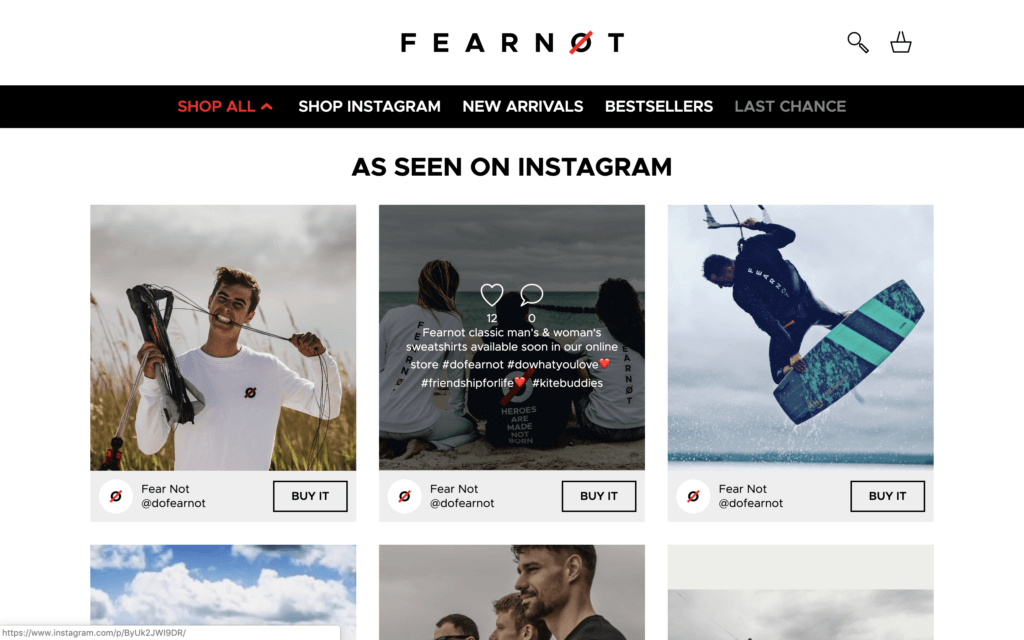
The Spree module which fetches posts containing the #dofearnot tag and features them on the store homepage references their authors and links back to the original post on Instagram. It’s a win-win and we are respectful of their intellectual property, image and so on.
So what’s going on with Instagram and Facebook from a dev perspective?
Technologically, the relation between Instagram and Facebook (its current owner) is now tighter. Apart from the obvious change of moving technical documentation from Instagram to Facebook, Facebook has swallowed Instagram’s API into it’s own Graph API and begun upgrading it. Some legacy features are already unavailable while others will disappear soon. Make no mistake – “depreciated” in this case means “disabled”. These are major changes requiring companies to adjust their Facebook apps and services. Otherwise, they’ll most probably break down.
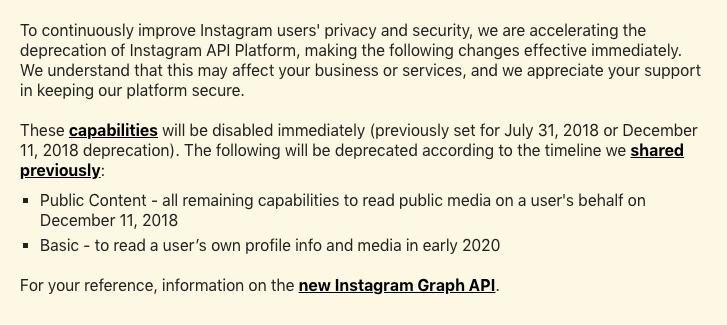
The changes range from security updates to new APIs. It’s clear that Facebook doesn’t want app developers to abuse their services and profile its users. Much of the information is or will be either restricted or completely blocked from access by third party apps. By applying this adjustment to their APIs, Facebook is forcing companies using Instagram data to better protect user privacy. By doing that it presents some challenges to app developers. Fortunately, they’re simultaneously making Instagram more welcoming to influencers and companies wanting to sell products on the platform.
The integration process with a store doesn’t stop at the technical level, though. Instagram and Facebook accounts now sync together and share information. Currently, to switch Instagram to a Business Account, a Facebook Business Account is required and the two accounts must be connected together. In return, Facebook can link to Instagram on profile and business pages and collect statistics. It’s a painless process. Facebook will suggest doing so at the right moment.
While developing Fearnot, our demo lifestyle brand, we’ve explored and come up against these tech limitations and business integrations.
How did we do it technically? Bear with us. Or skip this section XD
A few months ago, our Instagram module still used the old Instagram API to enable this exchange. It was well established, exposed as a Ruby gem and easy to incorporate into the project. But it was eventually time to switch to the new API due to looming deprecations and shutdowns. The new API requires more work to retrieve the needed data and some of it can’t be fetched at all anymore. More privacy for social media users means a lot more effort for the business owners.
Downloading posts authored by the Fearnot team (that’s us) works about the same way and all the information is still there but requires some tinkering with Facebook and Instagram settings and calling different endpoints to access. First of all, we had to connect Instagram with a Facebook business page and switch Instagram to a Business Account. Instagram posts can then be retrieved by authenticating a Facebook app which has Facebook Login and Instagram integrations enabled. Authentication happens through one of the users with admin permissions to the Facebook page. The app can be left in development mode and not reviewed by Facebook as it’s only used by a single entity and not available publicly for everyone to install. Yey!
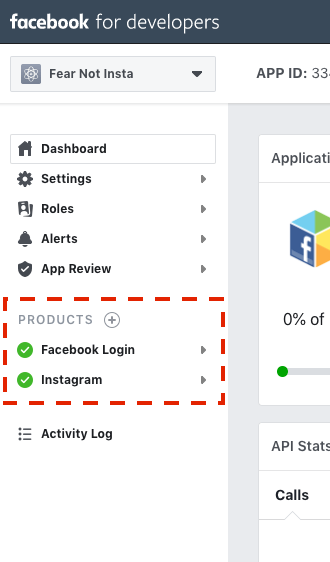
Once these are set up and an admin authenticates the app, a few API calls can lead to a full list of posts from the Instagram account along with information about their author, which in this case, is always the same and is the Fearnot Business Account.
That leads us to our desired results:
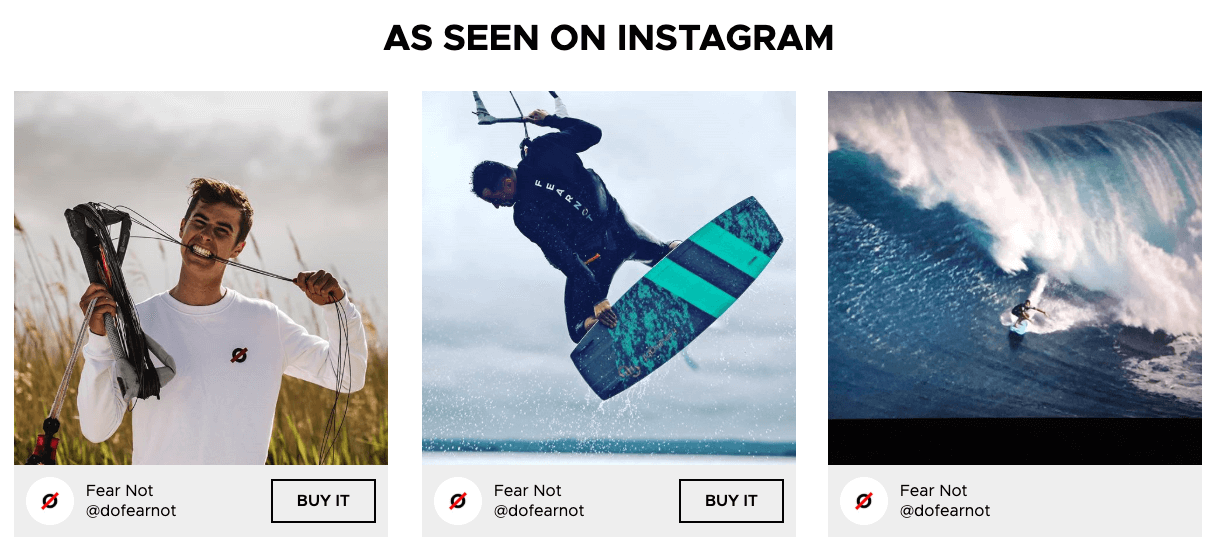
The effect is similar to the below:
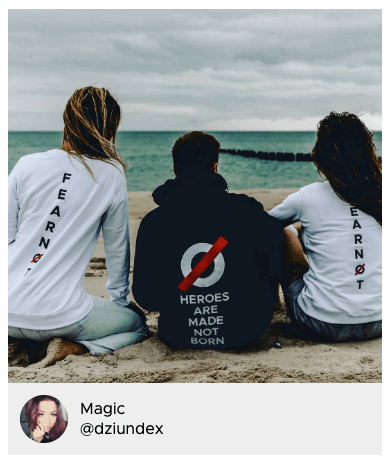
@mentions is a newer concept and has a slight edge over #hashtags when promoting a business. It provides a more direct reference to an Instagram business account in posts. Clicking on a @dofearnot mention leads directly to the account.
The @mentions Graph API is already public. However, using it the way we’d like in the Fearnot store requires influencers switch to a Creator Account. Not everyone on Instagram is permitted to make the switch just yet but will be in the months to come.
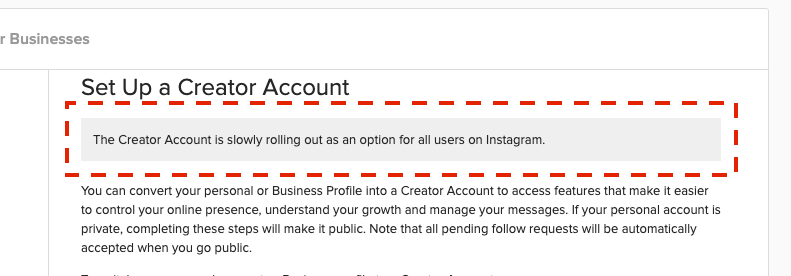
Currently, we’re listing Fearnot’s posts and hashtags on the store’s homepage. In the future, these will be complemented with @mentions. In the meantime, we’re using our business accounts for integrating and testing them.
Switching from #hashtags to @mentions seems like a small change on the surface but it goes a long way underneath. It makes posts more personal and relatable. Using both, a #hashtag and a @mention in a post is a great choice to maximize reach. They should also switch to business or influencer Instagram accounts which is a requirement for them to be visible in the Graph API and their information downloadable to a feed on a website.
Facebook is doing an admirable job of enforcing user privacy and encouraging businesses to leverage Instagram for marketing. The old Instagram API was more straightforward but the new one gives businesses and influencers more opportunities to cooperate. Switching our implementation to the new API required some work, decisionmaking, and workarounds. In the end, it works well enough. It will evolve over time and so will our integration with it.
What’s next for Instagram shopping?
Instagram is still expanding its shopping feature set. @mentions, tagging and direct Checkout are only some of the recent updates and more are coming soon. We’re looking forward to further advancements and figuring out ways to utilize them for commerce.
If you’d like to involve Instagram and influencers in your store’s marketing, we can help. We’ve been through this process and could help you implement similar integrations to enable Instagram shopping. Feel free to reach out through this contact form.


